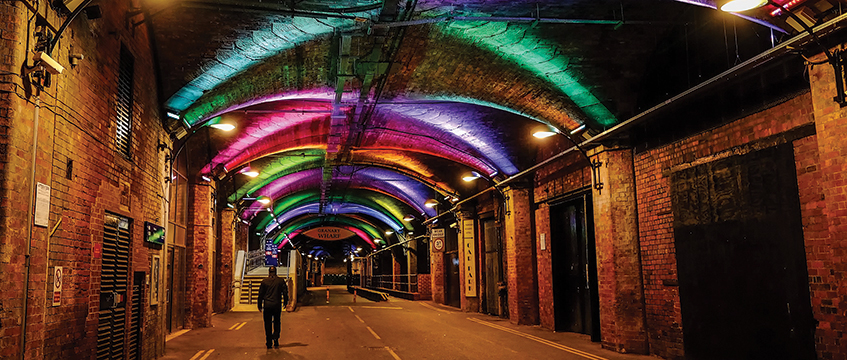Having been selected as the preferred party to buy Network Rail’s controversial £1.46bn Arches portfolio Blackstone and Telereal Trillium must now get to work extracting value from the assets whilst maintaining promises to tenants through a new charter.
The pair, advised by Cushman & Wakefield and Grant Mills Wood respectively, fought off competition from CK Asset Holdings, Kildare Partners and Terrafirma.
Kildare, which was being advised by Savills, is understood to have come close to buying the portfolio and was only around £25m behind the winning bid.
CK was being advised by BNP Paribas Real Estate and were the bid successful it is possible that the 100 or so staff currently running the portfolio could have transferred to the consultant’s management division.
Guy Hands’ Terrafirma, which is understood to have paid CBRE a £1m upfront fee to act on the deal, had sought funding from a number of parties including Partners Group, Nick Weber’s Henderson Park and Asif Aziz’s Criterion Capital, which had itself made it through to a third round of bidding.
A ‘tenants first’ approach
The 10-month-long Project Condor process, run by Rothschild, saw the establishment of a lobbying group, Guardians of the Arches, that protested against the sale on the grounds rents would be jacked up to unaffordable levels for SME tenants. However, the group said it “trusts [the buyers] will follow up on their stated intention to put ‘tenants first’ in their management of the estate” and greeted the news with relative positivity.
This followed a letter to tenants by the future owners that promised to launch a consultation, publish a charter, establish an engagement team and provide financial support for long-tenured small businesses facing financial pressure.
“If we need to maintain the diversity of tenants through accepting a lower rent than we would do in the open market then there is a strong commercial rationale for doing that in many cases,” says Adam Dakin, managing director for new business and services at Telereal.
“If you are prepared to take a long-term view and make sure you enhance value through creating a community that is vibrant and interesting then that is what makes it commercially viable. You don’t have to be philanthropic. You can do that and still be quite hard-nosed.”
Telereal is a long-term investor owned by the Pears family and Blackstone made its purchase using its core-plus Blackstone Property Partners Europe fund, which has lower return targets and time horizons than its traditional opportunistic vehicles, meaning the pair do not need to be as aggressive in their management as some prospective private equity buyers. The deal is also being geared at a relatively conservative level of close to 50% which will help enhance returns somewhat.
A new vehicle has been set up that Blackstone and Telereal own 50% of each to hold the portfolio. Telereal will manage the estate and may second in some of its staff. The employees that currently maintain the estate will transfer from Network Rail to the new company.
There were initially 5,476 assets earmarked for sale although this was ultimately reduced to around 5,200 with those excluded predominantly done so because they were needed for operational use of the surrounding infrastructure.
The portfolio includes around 3,700 arches, 930 buildings and 630 pieces of land. Of the collection of arches around 900 are empty.
“We intend to invest a lot of capital, particularly in the first few years, bringing those arches back into use where we can. Some of them might not be easy to access but several hundred can quite quickly be opened up,” says Dakin.
There are no plans to immediately sell-off any of the portfolio. It is understood that some development could be explored on elements of the land in conjunction with Network Rail although there will be no sets of Arches that will be redeveloped.
A new identity
Whilst it has not been set in stone, branding the business and creating a clear platform is something that is likely to happen in the medium-term which could see it become more customer-facing, more like other businesses Blackstone is involved in the running of like The Office Group and Logicor.
“We still need to decide plans on that as partners but it is being strongly considered. We intend that it is a business that will have its own identity,” adds Dakin.
The new business may well get its own name and brand and so too may groups of arches and areas within the portfolio as the new owners strive to add value to the estate through establishing a greater sense of place in specific areas.
“There are interesting business communities that it could be useful for to have local branding that appeals to their community and other business within the city. When you start to think about it with a creative mind there is a huge amount you can do,” Dakin says.
The Arches portfolio is the most scrutinised property deal by the wider public in several years and it is clear that Blackstone and Telereal are highly aware of the threat that swathes of angry tenants could bring. But if they manage to successfully implement their asset management plans it is possible they will both hit their return targets and keep their occupiers happy.
To send feedback, e-mail david.hatcher@egi.co.uk or tweet @hatcherdavid or @estatesgazette











